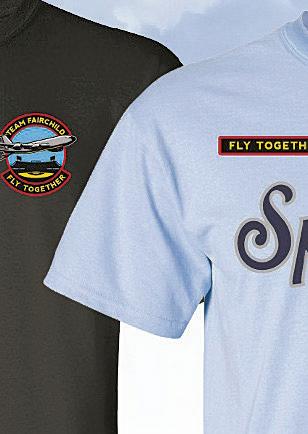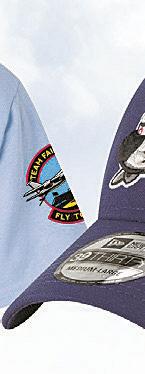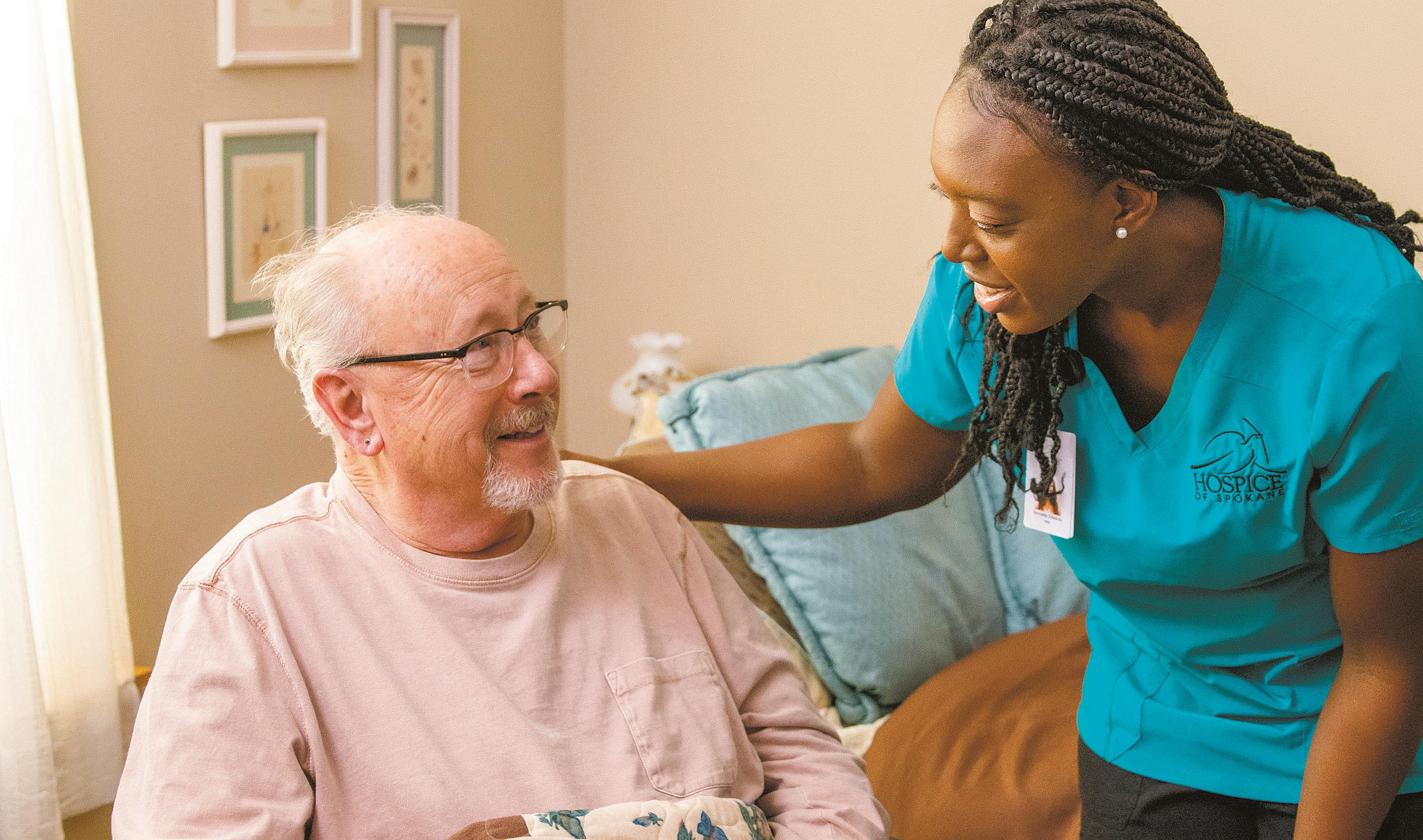VETERANS CHRONICLE AUGUST 2024
MORE INSIDE
• Available services for Spokane-area veterans
•How to score free tickets to area events

•Why the military runs on coffee

• Available services for Spokane-area veterans
•How to score free tickets to area events

•Why the military runs on coffee
By Ruth Aresvik
Veterans Help Net Correspondent
My first recollection of a good cup of coffee was at the chow hall in Fort Myer, Va. Yep. Army coffee. I’m a Navy gal and I love Navy coffee but there was no base for WAVES in the MDW (Military District of Washington). So, I was housed at Fort Myer. That coffee was good. This was around 1971. These days it’s: can I get a double shot tall skinny sugar-free no whip dry white chocolate mocha? With a straw and a sleeve? The Fort Myer coffee came from an enormous stainless-steel urn. Hefty white mugs. No cream or sugar for me. Straight up black coffee. And it was good.
Coffee has always played a major part in military life. It was in 1832 that President Andrew Jackson added coffee to the official military food ration. Troops developed a love of coffee for warmth, fuel and morale. Union soldiers were issued 36 pounds of coffee each year. In the field, they would roast, grind or crush
the beans with their rifle butts or the handles for their bayonets.
In his book Gettysburg: The Pivotal Battle of the Civil War, author Captain Robert K. Beecham wrote about soldiers and coffee. “The power of the soldiers to endure the fatigue of the march and keep their places in the ranks was greatly enhanced by an opportunity to brew a cup of coffee by the wayside.”
In the Navy, sailors used steam vents to heat their coffee. Or their cup of Joe. Ever wonder why it’s called a cup of Joe? There are many theories, but I like this one: In 1914, Secretary of Navy Josephus Daniels banned alcohol consumption on all U.S. Navy ships. Since coffee was the next strongest substitute, sailors sarcastically would refer to it as “a cup of Josephus” which was shortened to “a cup of Joe.”
In Vietnam, troops made coffee in the field using C-4 explosives as a heat source, as they did with
all
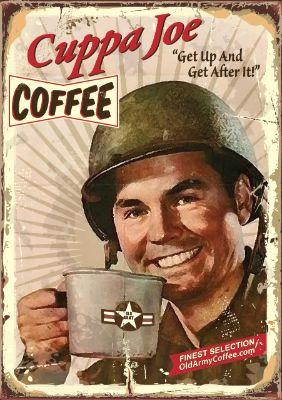
their c-ration cooking. Perhaps coffee played a more important role in the late 1960s and early 70s as soldiers returned home, pressured by Americans that questioned the U.S. role in the war. Coffeehouses sprung up in military towns outside bases across the country. These coffeehouses provided a vital gathering place where GIs could get away and say what they really felt; gather and talk openly about their worries and frustrations without judgment or fear. The same applies today. Sitting with a group of buddies and sharing coffee is a normal social interaction. It’s a way to talk and listen and support one another which can improve physical and mental health. An invitation for a cup of coffee can
eliminate isolation.
Coffee has always been a ritual of war. And now coffee can be a cup of hope.
So, if you will excuse me, it’s time for a break. Maybe I’ll check the Crazy for Coffee Facebook site (with 276K followers) while I enjoy a cup. How do you like yours? My sister Lori likes to hover a bean over the steam of a boiling kettle and call it coffee. My sister Carla prefers an Italian roast. I like mine fresh roasted. Strong, solid, faithful and bold. I call it America blend.
VETERANS HELP NET
Don Walker
Bryan Bledsoe
MANAGING EDITOR
Joe Butler
ART DIRECTOR
Anne Potter
DIRECTOR OF SALES
Scott Baumbach
Veterans Help Net partners with The Spokesman-Review to publish Veterans Chronicle each quarter to increase awareness about veteran issues and to help veterans find hope and help.
To share a veteran story or information about resources for veterans, please contact info@ veteranshelpnet.com, call (509) 998-6484 or visit www. VeteransHelpNet.com.
Spokane County Veterans Service Center provides help And: Benefits available from Veterans Service Center
For advertising information, please contact advertising@spokesman. com or (509) 459-5095.
No portion of this magazine may be reproduced in whole or in part without written consent of the publisher.





























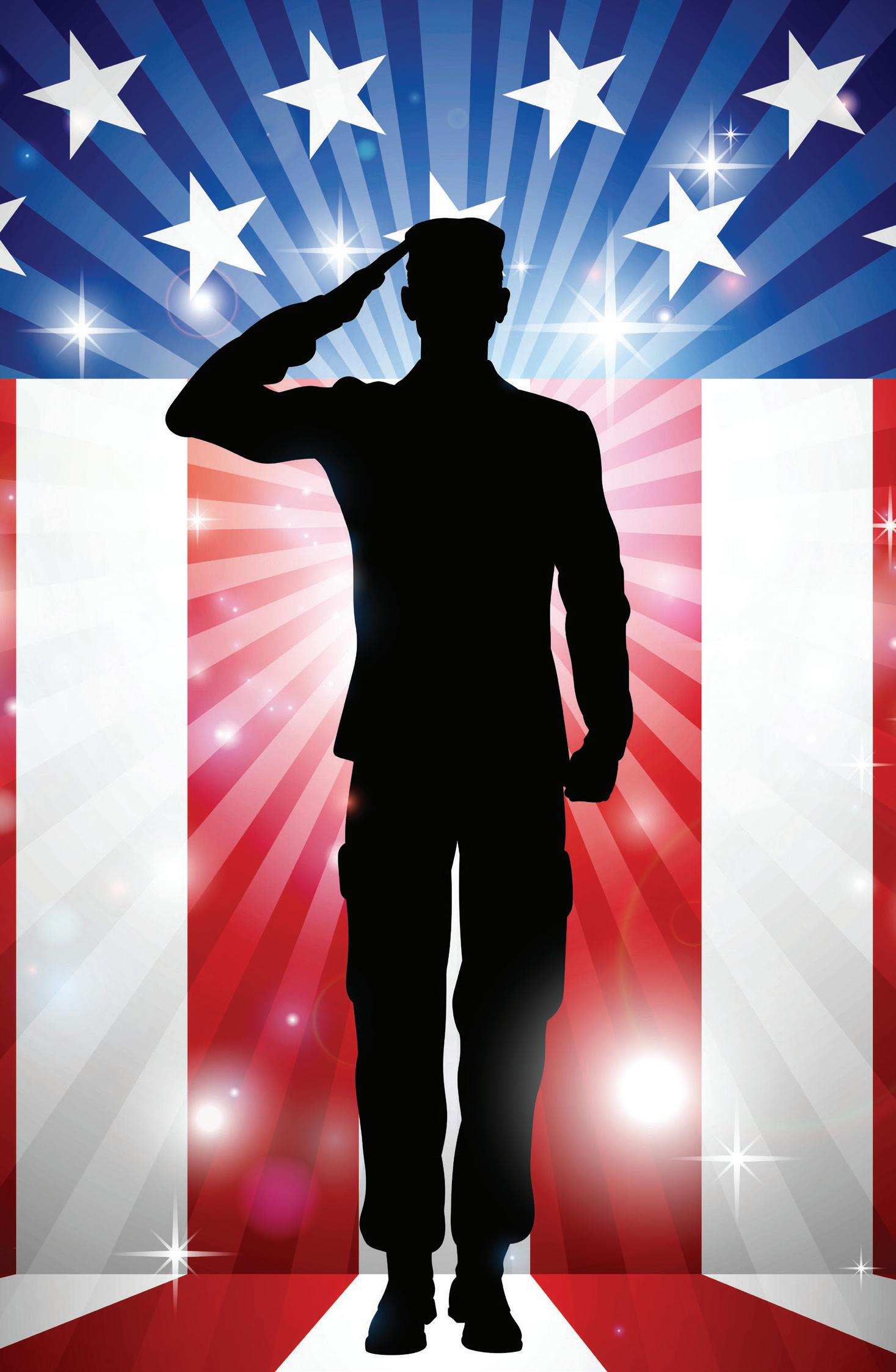



If you have already begun the claims process with the Veterans Service Center, you can still call, and a note will be entered into your case for a VSO to call you back for assistance. That VSO has a goal of returning your call within a week. If you have not filed before, you will be asked to start an intake packet, outlining the services you are requesting. You can fill it out at the office (1117 N Evergreen Road, Spokane Valley) or an email can be
sent to you if you are unable to make it to the office. A VSO will review your information and call you to set up an appointment.
The number to start the process is (509)477-3691.
(The information was provided from the newsletter of the Veterans Newsletter of the Spokane Veterans Service Center.)
The VSOs are accredited through the VA. They are county employees providing free services educating veterans, submitting and building a complete package to enhance the odds for a successful outcome. The VSC programs also serve the veterans. With up to 7,000 claims filed in the last two years, the team is well versed on how best to serve your needs.
An experienced VSO will explain terminology, clarify rules and laws, and make the claims process understandable. Ask questions of a VSO and initiate a claim while receiving clarifying direction. Open to veterans and family members of veterans.
Location: SCRVSC conference room 4th Thursday of every month Next Class 2-3 p.m. August 22 Call (509) 477-3690 to reserve your spot.
The Center has a technology workspace that can be used by veterans and family who may not have access to a computer, copier, or fax. If you find VA on-line services, IDme or computers intimidating, the Workstudy and Skillbridge team are here to help.
Members and family may request on-line
Login to: https://www.archives.gov/ veterans/military-service-records Click: Start Request On-line
The free copy takes about 2-3 weeks, arriving by mail.
Need assistance/no computer access?
Come in and use the center’s computer workspace.
Need help today? Or to get more information from Local resources: go to the “How Can I Get Help?” section on Page 5 or contact Spokane County Regional Veterans Service Center at (509)477-3609 or Kootenai County Veterans Service Benefits Office at (208) 446-1092.














VA.gov
The Department of Veterans Affairs website has resources on every topic relevant to veterans.
VA.gov/welcome-kit
Spokane County Regional Veteran Service
1117 N. Evergreen Rd., Spokane Valley, WA (509) 477-3690
Spokane County Regional Veteran Service (509) 477-3690
Vet Tix provides tickets to events which reduce stress, strengthen family bonds, build life-long memories and encourage service members and veterans to stay engaged with local communities and American life. The program supports our troops by honoring their service and providing positive family and life experiences, during and after their years of service to our country.
Tickets are available to all branches of currently-serving military and veterans, including immediate family of troops KIA. Tickets can be for sporting events, concerts, performing arts, educational and family activities.
To participate, people can sign up online at vettix.org. The company verifies service. Once someone is registered with a free account, they can request tickets to events that interest them, then pay a small delivery fee to receive their free tickets.
Veteran Tickets Foundation teams up with major sports teams, leagues, promoters, organizations, venues and ticket holders to provide free and discounted tickets to the more than 21 million military and veterans. Currently serving military, honorably discharged veterans from all branches of service, and family of those Killed In Action are eligible. Tickets are either distributed directly to military bases or claimed through our website.
Veterans must provide proof of service or eligibility, such as a DD214.
The 7% of our population that are veterans and less than 1% actively serving shoulder unique burdens of stress, sacrifice and time away from their families. The majority of our veterans have served during wartime. Veterans experience many difficult transitions as they reintegrate back into their families, their communities and eventually civilian life. Many service members and veterans struggle with wounds of war, both physical and invisible.
Yet these veterans receive limited access to resources that are vital to their reintegration into their communities. Military discounts are small or infrequent. The majority of veterans do not receive military discounts because they do not have an ID card. More than that, the cost for the average football game or concert is over $500 for a family of four. This makes many events simply unaffordable for average military and veteran families.
Veteran Tickets Foundation is concerned that too many veterans are missing out on the All-American moments for which they have fought and sacrificed. These All-American events are the times we should use to welcome and acknowledge our veterans. These events provide essential community reintegration opportunities, family bonding experiences and improve quality of life. Donated tickets shows our military that their community supports their service. These events are real gifts of gratitude for our veterans who have given so much.
The VA Welcome Guide covers all types of benefits and services available for veterans, new recruits, active service members and their families.
Explore.VA.gov/benefitsnavigator
Explore VA benefits and discover which ones you and your family may be eligible to receive.
Apply for emergency services, or have any benefits or service questions answered by 5 Veteran Service Officers (VSO) and staff.
Kootenai County Veteran Services and Benefits Office
120 E. Railroad Ave., Post Falls, ID (208) 446-1092
Meet with a VSO or staff for help with VA benefits enrollment, claims or other veteran needs.
Goodwill Support Services for Veteran Families (SSVF)
130 E. Third Ave., Spokane, WA (509) 828-2449
SSVF helps homeless veterans and their families find housing and connects veterans with other support organizations.
Healthcare for Homeless Veterans (HCHV)
504 E. Second Ave., Spokane, WA (509) 435-2019
Provides healthcare and outreach for housing, job opportunities and counseling.
Kootenai County Veteran Services and Benefits Office
120 E. Railroad Ave., Post Falls, ID (208) 446-1092
Veteran Crisis Line 1 (800) 273-8255, press 1
North Idaho Crisis Center (208) 625-4884
Washington or Idaho 2-1-1
Dial “2-1-1” for health and human resources referrals.


By Dave Sutton
There are more veterans locally who are finding out that they have benefits coming to them earned by their service in the military. There are more benefits available to veterans than ever before. There are more professionals and volunteer Veteran Service Officers (VSOs) helping our veterans acquire benefits.
And there is a veteran’s service organization that is spearheading assistance programs available to all veterans.
The Washington State Department of Veterans Affairs (WSDVA) and the Spokane County Regional Veterans Service Center (SCRVSC) are discovering more and more veterans are leaning on them for help. In one recent quarter of the year over 18,000 telephone inquiries came into the SCRVSC from veterans seeking information and assistance. Nearly 7000 claims were dealt with at the Center and over 7900 planned services (not-claim related) were completed.
“Most of the inquiries at the Center came from veterans who wanted to know if they qualify for certain benefits, “according to Chris
Dorcheus, SCRVSC Operations Manager. He said they are expected to deal with over 8000 cases this year.
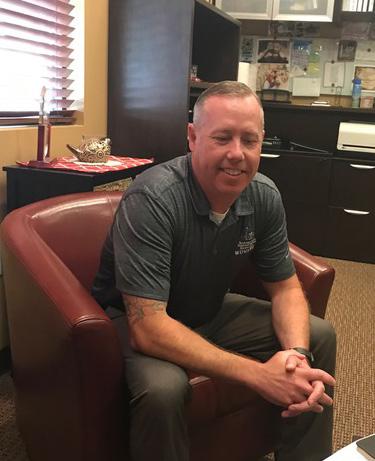
Chris Dorcheus, SCRVSC Operations Manager
“One of our focuses at RVSC is to get connected with veterans so they can receive full veteran benefits, said Dorcheus, “And that involves educating our veterans so they can understand what they are entitled to.
The SCRVSC and the WSDVA team up to make sure a complete investigation for information is done for the benefit of the veteran.
Dorcheus noted that 5 full-time professional VSOs are a part of the RVSC team. The VSOs share research responsibilities and data as to complete a thorough record regarding the veteran’s claim.
The VSOs usually have busy schedules interviewing veterans and
following through on benefit sources. More and more success stories are coming from veterans who originally did not know where to turn for disability benefits, housing assistance, transition programs into civilian life after discharge, business certification programs and much, much more.
“It’s true that our veterans who file claims may have to wait for (what seems like) a long period of time,”
Dorcheus, a retiree of the United States Air Force said, “But we want to make sure the proper activities are completed on every level. The average claim may take up to 200 days to settle.”
Why does it take so long?
“First, there are thousands of claims being filed. We saw 7000 plus claims, and that is in addition to over 18,000 telephone inquiries, and a steady flow of new clients and nearly 15,000 planned services completed,” Dorcheus emphasized.
He noted that there can be up to a dozen agencies and organizations working through a somewhat complicated system. He pointed out that many of the claims are pending further information…” waiting to
make sure we get everything right.”
One claim was made by a Vietnam veteran who developed medical complications from exposure to Agent Orange. As a result of the exposure, he developed Parkinson’s Disease. Along with SCRVSC other organizations stepped in and investigated the claim. It took 2 years of research and examinations by civilian doctors and VSOs to settle the claim.
The veteran received a large cash award and monthly compensation for his injury.
“But,” he said, ‘it was worth it!”
Dorcheus said that sort of case is typical. Many veterans have had complications from Agent Orange and are successfully claiming benefits.
All the VSOs go through the same training for their job, and, as a team they work together. Dorcheus said the team members have developed some “unofficial” specialties as they assist claimants.
For example, Dorcheus noted that VSO Brad Condon, a retired Washington National Guardsman, is especially proficient as a Data Analyst. He is known in the office
for going over information to find the littlest details that might help a veteran. VSO Julio Torres, and Air Force retiree, work very well as a Data Specialist, making sure all the forms and filled out properly and their sentences and punctuation are right.

VSO Kevin Jacobs, retired Air Force, shines as a Relationship Builder, according to Dorcheus. “He especially has a heart for helping others (as all the VSOs do) but Kevin is exceptionally skilled at his work,” said Dorcheus.
Kari Gardener. a U.S. Air Force vet, ranks high in the field of Detail Orientation. Like Torres, she watches for facts, the application of proper regulations and many other details. If those areas are errant or overlooked it can delay processing.
Megan Ross, with 7 years in the USAF and 4 in the USAF Reserves, is a trainee at the RVSC. She said she “is just soaking up anything the others can teach me. There is so much to learn.”
Marvin Tucker, Sarah Dye and Genie Bouck serve as Administrative Assistants.
Cat Nichols, Senior Director of Community Affairs, works together with several agencies from her SCRVSC office.
Dorscheus walked through a typical inquiry at the SCRVSC.
“When a veteran first comes to us, we begin with questions about prior treatment in the military,” he said. “Then we work with the veteran to
see if he qualifies for benefits. He may wonder about a certain situation that occurred in in the service and may learn that there are other benefits due him.”
“It’s all about education,”
Dorcheus noted. “We want our veterans to know all the facts concerning a claim and all the benefits that are available. And we must dig pretty deep sometimes to find the facts!”
Dorcheus said one veteran was injured while serving in Guam. But the VSO could not find any military record or proof that the veteran was ever in Guam. After an extended search and some creative thinking, the VSO discovered the vet had a post card from his girlfriend that was stamped with a postmark from Guam. After consulting military personnel, the postmarked mail was accepted as adequate proof that the veteran served in Guam. Following that extended research and many interviews the record was set straight, and the veteran received a very large compensation of backpay plus other benefits.
“Education is extremely important,” Dorcheus pointed out. “Many misguided research projects come up short because misinformation is given to both the veteran and other agencies involved in helping,” he said.
Our (SCRVSC) methods and programs take a thorough approach in order to be accurate so it may increase the quality of veteran’s lives. “The entire SCRVSC team meets are various times with Directors and Managers (both county and state) and other VSOs to collaborate and give feedback on claims, regulations and the future of Veteran Assistance.
“It’s always best to support

each other for the benefits of the veterans,” Manager Dorcheus said with pride, enthusiasm and a big smile!
The Spokane County Regional Veterans Center is located at 1117 N.Evergreen Road in the Spokane Valley. Call (509) 447-3691
Dave Sutton served as a Military Journalist in the U.S. Army. He has 4 grown children and resides in the Spokane Valley with his wife Vickie.
Stop by the Spokane County Veterans Service Center on September 21 to meet the staff and tour the facility supporting veterans and their families. Personnel will be on hand to answer any questions and begin the claims process. The event runs from 10:30 a.m. to 3 p.m.
It’s an opportunity to meet area partners who support veterans providing services such as mental health, employment, and more. As a token of the center’s appreciation, the staff is offering a free lunch. Help us spread the word and post the flyer.
The location is at 1117 N. Evergreen Rd, Unit 2, Spokane Valley.
One of the most rewarding aspects of working at SCRVSC is the gratitude and thoughtful appreciations exhibited by many. The outpouring of heartfelt thanks, particularly from supported family, helps reinvigorate the staff during long days. The government and military systems are difficult to navigate even for military members who are familiar with rules, regulations and complex systems. Feedback from many family members is they are intimidated by the idea that a missed detail or lack of understanding of terms and forms could ruin claims or benefits, creating
more stress for loved ones. This is where the staff shines. Often, they are seeing family members in the most stressful of times. A change of life circumstances, hard times, illness and passing of a loved one. There are options available to support spouses and children of veterans that include burial benefits, claims assistance, education benefits, transfer of disability benefits, assisted living benefits, and more If you are the surviving spouse, child, or parent of a service member who died in the line of duty, or the survivor of a veteran who died from a service-related injury or illness, you may
be able to get a tax-free monetary benefit called VA Dependency and Indemnity Compensation.
If you are in need of assistance stop in anytime, no appointment needed and the center can help make this process a little easier. There is no need to navigate this process on your own.
The staff is here to support you in any way we can.
The Spokane County VSC is at 1117 N. Evergreen Road, Spokane Valley, and can be reached at (509) 477-3690 or online at www.spokanecounty. org/1122/ Veteran-Services
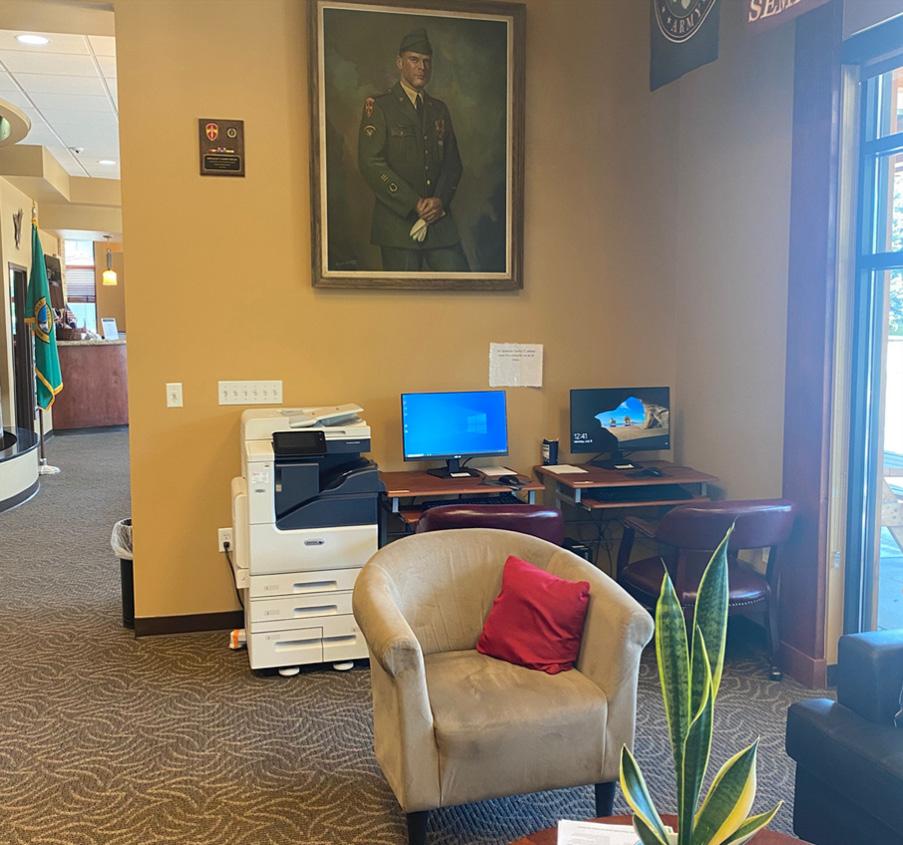
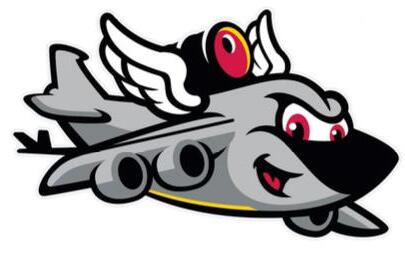
On May 27, 2021, the Spokane Indians baseball team launched the Operation Fly Together campaign, which stems from a historic agreement between Team Fairchild and the Indians, designed to celebrate the KC135 tanker, build pride for the base’s critical functions, and help better the lives of veterans from all services that have settled in the Spokane region.
The idea arose from a 2011 viral video of Sgt. Chris Weichman surprising his family, by reuniting with them on the field of an
Indians game after an early break from his third tour in Afghanistan.
Supported by STCU, Innovia Foundation, KHQ Television, and The Spokesman-Review, the campaign builds financial support and awareness for the newly created Operation Fly Together Veterans Fund, administered by Innovia. In addition, the program has been endorsed locally by Spokane County Regional Veteran Services.
The partnership campaign centers around the pillars of Community, Honor, Education, Support, and
Celebration. Donations and merchandise sales contribute to veteran grants and memorials donated back into the community
Throughout the summer you may see members of SCRVSC at their table providing outreach and education services at evening games. Feel free to stop by and ask questions.
VA officials will be conducting in-person C&P exams, also known as a VA claim exam, at select locations throughout the country.
How VA will contact you:
If you require an exam, you’ll be contacted by a VA contract medical examination provider to schedule an appointment.
You will receive a letter by mail with the date and time of your exam or a phone call to find a time that works for you.
After receiving your letter or phone call, you should call the number provided to confirm the time and location of your exam.
What if I can’t attend the in-person exam?
No claim will be denied, and no final action will be taken until an inperson exam can be safely completed.
What should I expect at my VA claim exam?
THE DOCTOR MAY:
• Review your claim file with you.
• Perform a limited physical exam.
• Ask you questions based on the medical records in your claim file.
• Ask you to get other tests if needed.
What happens after my exam?
VA will review all the evidence in your file, assign your disability rating, and send you a decision notice. Each claim is different, but it usually takes 3 to 4 months to process a claim from start to finish.
I can’t make my exam as currently scheduled. What do I do?
If you can’t make it to your appointment, you can reschedule by contacting your nearest VA regional office or calling 1-800-827-1000.
How do I know if a legitimate VA representative contacted me?
If you feel you may have been improperly contacted or would like to confirm the legitimacy of the C&P exam, please call 1-800-827-1000 or contact your nearest VA regional office.
For more information on local resources, go to the “How Can I Get Help?” section on Page 5 or contact Spokane County Regional Veterans Service Center at (509) 477-3609 or Kootenai County Veterans Service Benefits Office at (208) 446-1092.
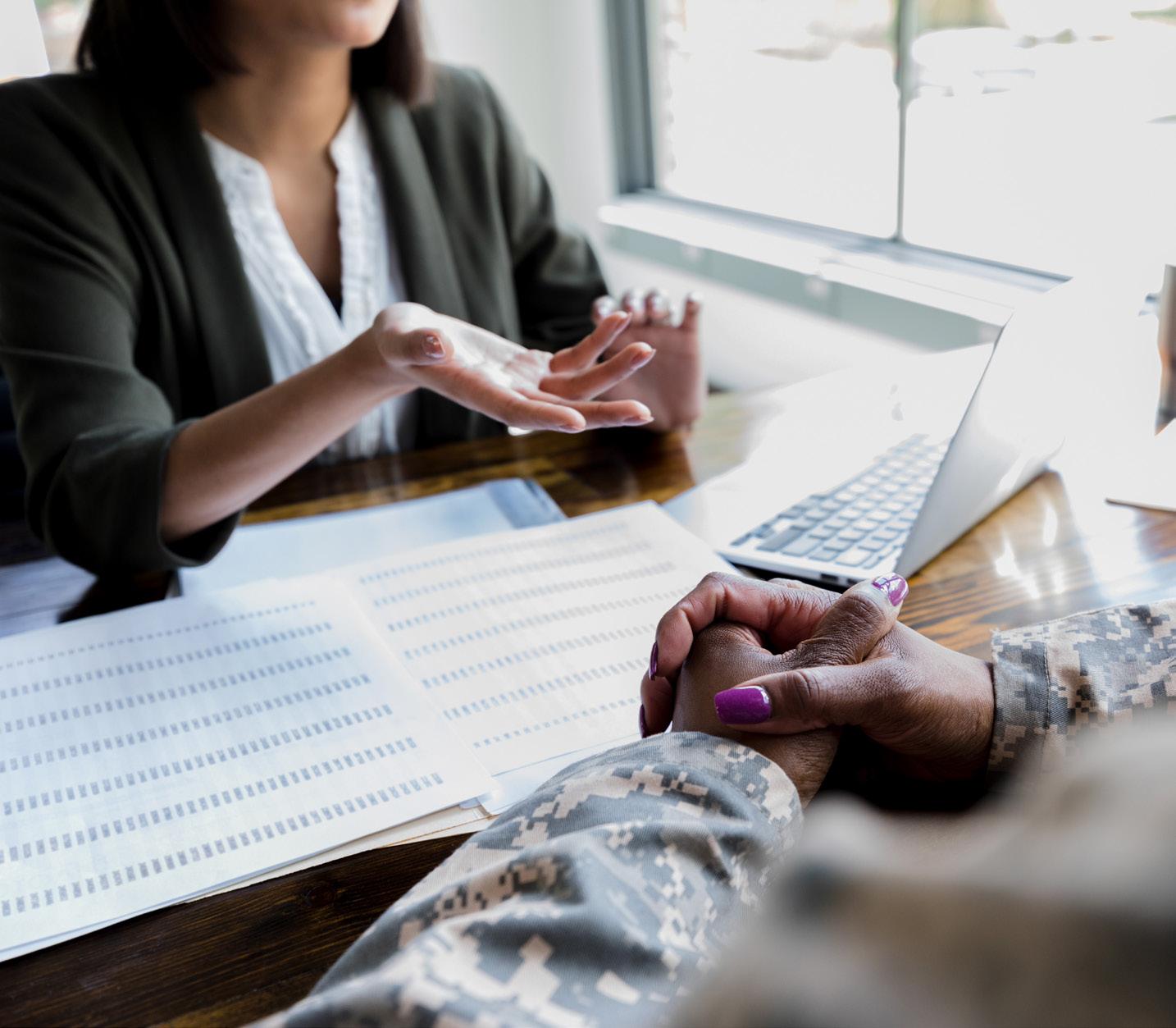

Cheetos were made from surplus war rations
During World War II the U.S. military was looking to cut down on shipping cost for war rations. In 1943, a USDA scientist did what was previously thought impossible: figured out a way to dehydrate natural, fatty cheese, making it easier to send across the ocean. After the war, the military was left with a bunch of leftover dried food, which was offloaded to private companies. One of the corporations to take advantage of the processed food fire sale was Frito, now Frito-Lay. In1948 it rolled out one of the most famous uses of dried cheese to date: Cheetos.

In 2017 Catherine “Cat” Nichols, Strategic Operations Manager in the Eastern Washington Division of the Washington State Department of Veteran Affairs, embarked on a strategic mission.
Recognizing a severe lack of services available to over 64,000 military veterans on the east side of Washington, a group of inspired leaders from WDVA and Spokane County, thinking outside the box, gathered. They developed a consolidated service program that began as a distribution of the Veteran Relief Fund.
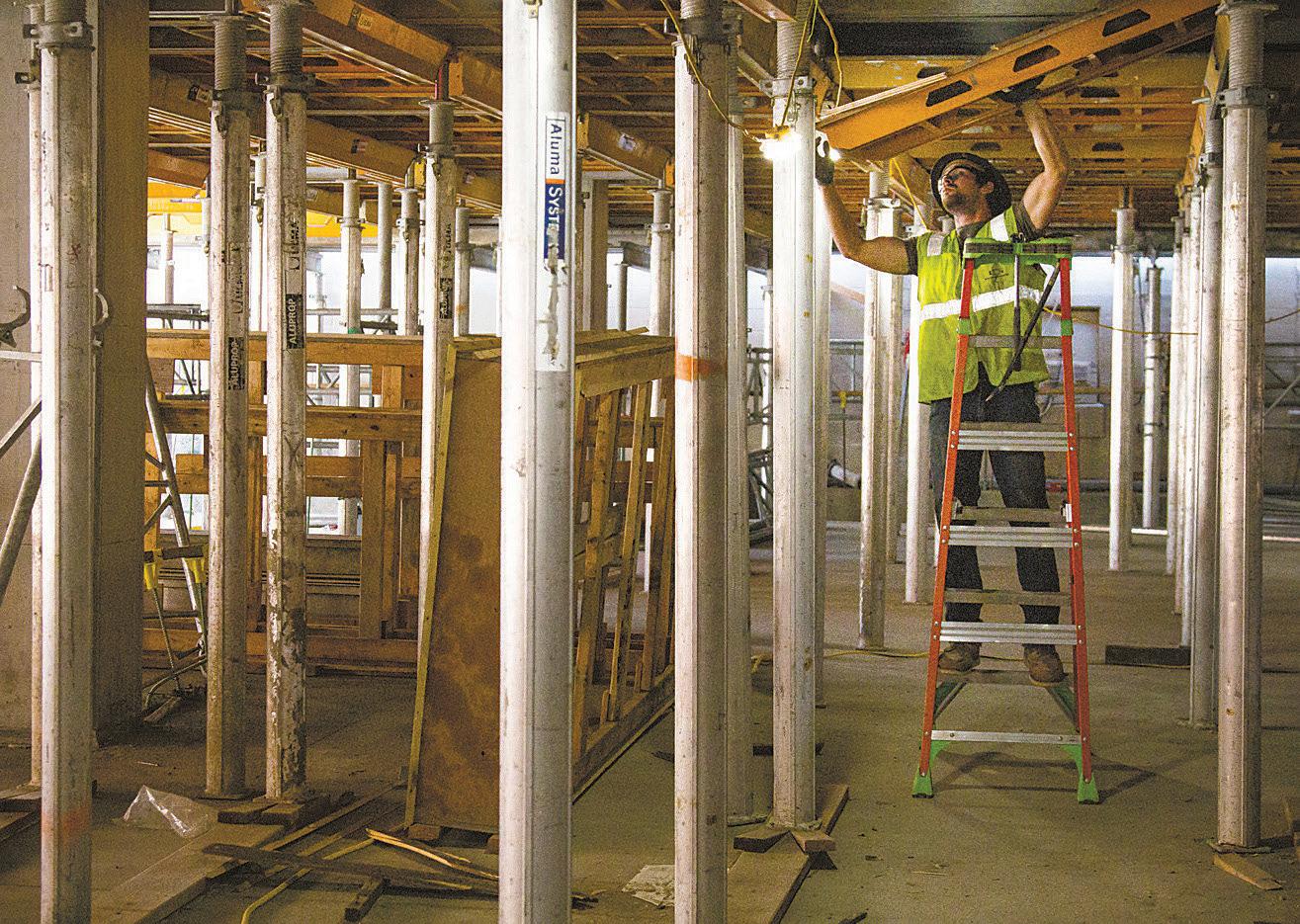


In a few short years, the center has grown into a one-stop shop connecting veterans to benefits and education and job placement. The community-centered program produced a dramatic drop in veteran homelessness, while increasing support and self-reliance for veterans and their families. Cat Nichols now serves as Director of Community Affairs at the Spokane Regional Veterans Service Center.
In a move to make information more accessible to veterans, the VA is using va.gov for appointments, records access, education benefits information, and much more. This is why it is recommended that you create a VA.gov account for yourself or the veteran you are helping.
My VA Health vs Healthevet
First step, make sure you are in the right portal for your needs.
If you’re using Mann-Grandstaff VA Medical Center:
To access your VA health record and send a message to your health care team, go to My VA Health
Use Healthevet for medical records, clinical notes, make appointments, medication, payments, medical supplies, labs and tests results, and sharing; use Blue Button. Read the information on the pages and the directions will help you navigate the site. If you are having troubles, the search bar is useful.
It is worth going through the VA.gov website to see all that is available. Like all new things, it takes a minute to get used to everything. The convenience of having a VA ID cards delivered, accessing your records easily to submit claims etc. can be worth it. Good luck!
For many veterans, these five words of gratitude are difficult to receive. A recent survey found that nearly 70% of service members and veterans feel uncomfortable or awkward when people tell them, “Thank you for your service.” Over the years I have friends communicate that they are genuinely thankful and ask why veterans feel uncomfortable with this heartfelt sentiment. Each time I have struggled to explain that the phrase doesn’t convey an understanding of the sacrifices and experiences we’ve had in the military.
This past Veteran’s Day I was listening to a doctor’s insight on the
importance of honoring our military, beyond the words “Thank you for your service.” The phrase honors people who are willing to lay down their lives for our country. Such a group of people who will sacrifice themselves for the greater good have earned a special place in our society and deserve our gratitude and appreciation. Touched by these words, I’ve shared this with hardened, experienced veterans. We all have similar responses:å a relaxing of the shoulders, softening of the face, and perhaps a welling of tears of relief – the kind that occur when you’re finally seen and

On 22 June 1943, Jacqueline Cochran was appointed as Director of Women Pilots, while Nancy Love assumed the role of directing the women of the Air Transport Command. Later in August, the two programs merged and became the WASP.
Members of WASP became trained pilots who tested and ferried aircraft and trained other pilots. Their purpose was to free male pilots for combat roles during World War II. They flew over 60 million miles;

transported every type of military aircraft; towed targets for live antiaircraft gun practice; simulated strafing missions and transported cargo.
The WASP and its members had no military standing and it took another 30 years before women were allowed to fly in the military. In 1977, for their World War II service, the members were granted veteran status, and in 2009 awarded the Congressional Gold Medal.
understood.
I recently heard a story told by Nicole Malachowski, the first female Thunderbird pilot. Struggling with these same words, she asked a World War II vet how he handles this phrase. He said he made a decision to create connection. Anytime someone says, “Thank you for your service,” he pauses, looks them in the eye, and says, “You were worth it.” We are conditioned to downplay our experiences. As veterans, we all know someone who had it worse, or harder, or perhaps didn’t make it home. We see this at the SCRVS Center when folks are reluctant to

inquire about benefits they may be entitled to. On days like Memorial Day, while we remember and honor the sacrifice of our friends, squad mates, and more, I hope you are able to take a moment and realize that “You are worth it.”
This article came from Spokane County Regional Veterans Service Center June 2024 newsletter. For more information go to the “How can I get Help?” section on Page 5 or contact Spokane County Regional Veterans Service Center at (509) 477-3609.




